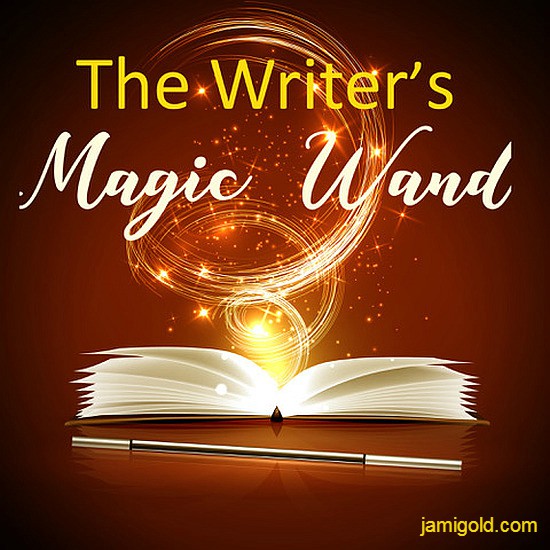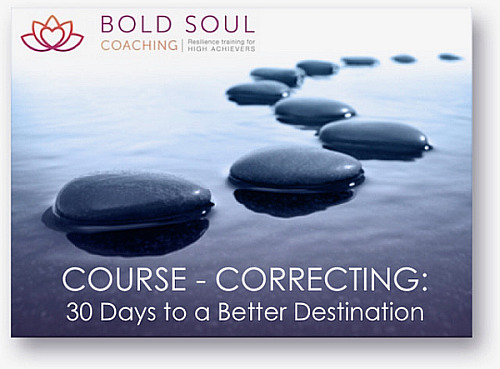Writer Productivity: Who Needs a Magic Wand? — Guest: Pascale Kavanagh

Today’s the first day of NaNoWriMo, so today kicks off the first of many fantastic guest posts I have lined up for us while I’m desperately trying to find my writing groove again. *grin* Luckily, I have the perfect post to get us started on the right foot—whether we’re doing NaNo or not.
Productivity is a major buzzword for writers, especially during NaNo. But even if we’re not doing NaNo, we all want to increase our focus, reduce our distractions, ditch the self-doubt eating away our motivation, and get more words on the page whenever we sit down to write.
Pascale Kavanagh is here today to teach us how we can improve our mindfulness through meditation. In turn, that mindfulness will help our focus, allow us to ignore distractions (even the self-doubt kind), and turbocharge our productivity. Yay!
Please welcome Pascale Kavanagh! *smile*
*****
A Writer’s Magic Wand
By Pascale Kavanagh
Poof! Bye bye writer’s block.
Poof! There goes crippling self-doubt.
Poof! Arrivederci resistance, comparison anxiety, and struggle.
Oh, if only it were that easy. Is there a single one of us who would turn down an offer to wield that wand? I think not. But there might be another way.
Something to meet the needs of a healthy, productive, joyful writer.
More focus? Check.
Less stress? Check.
More stamina? Yup.
Less strain? Uh huh.
Greater access to the Muse, or whatever you call your creative well? Absolutely.
That magical fairy dust is meditation.
I’d bet that everyone reading this article has heard the not-so-new news that meditation is good for you. I could fill your hard drive with articles from our most revered institutions demonstrating the quantifiable benefits of this practice. And yet, like most of what is promoted as good for us, it doesn’t get nearly as much attention as it should.
I’m here to give you that last piece of ammunition to finally make the decision to get your own magic wand. To tip you over the edge of interesting to Yes!
Not only to be a better writer, but to be a better human.
First, let’s dispel some myths.
3 Meditation Myths to Ignore
Myth #1: I could never _____________________________.
(meditate, sit still, shut off my thoughts, etc…)
You don’t go to school because you already know your ABCs. The reason it’s called a practice is because we’re all learning. Even those of us with decades under our belts.
Navigating the wild interior landscape of our thoughts is no joke. I estimate it’s going to take lifetimes before I stop discovering something new. The most useful perspective to bring to the practice is beginner’s mind. If you are actually a beginner, you’ve already aced that part of the assignment.
To ease any further worries… Shutting off your mind is not only impossible (while you’re still alive) but also not required. You’re welcome.
Myth #2: I don’t have the time.
Yeah, I get this one a lot. You know what those clever old Buddhists had to say about that?
“You should sit in meditation for twenty minutes a day. Unless you’re too busy, then you should sit for an hour.”
Yup, the busier you are, the more you need it. And no one’s asking you to start out with one or two hours. The practice I offer you below takes three minutes.
I have very busy and important clients, and I’ve never met anyone who doesn’t have three minutes. That includes you. (Yes, you.)
Myth #3: I need a soundproof meditation room and a Tulsi-seed cushion.
There’s a name for people like you and me. We are called householders, as differentiated from the ascetics, renunciates, and all those lucky bastards who get to escape their partners, offspring, jobs, and other responsibilities to luxuriate in the peace and quiet for years at a time. (Maybe that doesn’t sound like paradise to you, but some days, it’s all that for me.)
Doubt meditation will work for you? Don't let these 3 myths hold you back — by @pekavanagh Click To TweetInstead, we get to build and grow our mindfulness practices in the beautiful chaos of a multi-dimensional life. It’s not necessary to have a pristine environment, the most trendy cushion, or technology of any kind. Heck, I’ve been known to meditate in my parked car before entering the house, in my bathroom, in parking lots, waiting rooms, and during boring meetings.
Learning to find peace within when there’s very little of it out there is the fast track to bringing a meditative state to every part of your life. Stuck in traffic? Breaking up a fight among the kids? Trying to crank out another ten thousand words so you don’t miss your pub date? Being able to drop in—no matter what—is the gift that keeps on giving.
What Is Meditation?
Now that we’ve banished those pesky myths, let’s agree on a definition for this all-powerful practice.
Here’s mine:
Meditation is a state of being during which the inherent qualities of calm, focused contentment become more present than the frenetic, consumptive mind and body busy-ness.
Here’s another smarty-pants:
“Meditation is not just for relaxation. Its primary purpose is to develop the capacity to respond skillfully and gracefully to life’s difficulties as well as its joys.”
— Shyalpa Tenzin Rinpoche
Extra special sidenote: Meditation is not something you do (although we’ve all gotten used to using it as a verb). It is a state of being that naturally arises when particular conditions are met.
It’s like sneezing, or sleeping, or orgasm. You can’t do them, per se, you can only create the circumstances from which they will arise.
What Does the Practice of Meditation Mean?
The practice of meditation invites us to:
- evoke those conditions, which include mindful stillness or movement while focusing on the breath or other object(s)
- sustain for a period of time
- repeat consistently
- apply liberal amounts of patience, compassion, and intention
Like learning a new language or an instrument—or, dare I say, how to be a better writer—acquiring the skill of meditation requires focused, sustained, consistent effort. That’s the hard part for most people.
Those first twenty minutes, wrestling with the hopped up monkeys who’ve hijacked your brain and now have made every itch, ache, or pain in your body suddenly unbearable, is hard enough. But to come back and do that again—every day!—is a deal breaker for many.
And yet, that’s where the magic happens.
4 Ways Meditation Is Good for Writers
Benefit #1: Opens Up the Creative Spigot
Where do all those wonderful ideas come from? Where is the ability to turn simple words into something that moves people created? That’s a topic for another article, but all you need to know is that it’s there.
Yeah, all the way in there. *waits as everyone looks down toward their navels*
Want to be a better writer? 4 ways that meditation can help — by @pekavanagh Click To TweetThat miraculous ability, which makes us as writers equal parts genius and lunatic, which has been attributed to a set of goddesses, is no small thing. The problem is, it’s like a skittish cat for many of us. Never wanting to appear when called, and disappearing at the first sign of a distraction.
In order to get that flow going, to open the faucet as far as possible, the conditions have to be met. (Sound familiar? Creative expression is another one of those pesky states of being.) Way down deep under all that brilliant analytical machinery that keeps us functioning as productive citizens, is a powerhouse to turn something that didn’t exist into something that now does.
All your wordsmithery is nothing less than abra cadabra for stories. Trying to access that magic under the weight of life—jobs, illnesses, dependents, traffic, or whatever that means to you—is like roaming the desert for a gelato shop. Makes a hard thing even harder.
When we sit, letting ourselves grow quiet and still, tuning into the natural rhythms of the breath and the heart, the liquid gold starts to flow. And not just in that moment, but potentially throughout the entirety of your day.
What’s better than having creative nectar a turn of the tap away? Nothing I can think of.
Benefit #2: Releases Mental Tension and Congestion
It’s like a sports massage or ice bath for your brain. All that thinking—turning simple words into art—requires gobs of mental effort.
Meditation punches out all those kinks, knots, and tight spots. It’s nothing short of miraculous how a short period of slowing down the breath, and narrowing the scattered spray of mental activity into one bright beam, can make all the strain drop away.
I sometimes think of meditation as the ultimate palate cleanser. It can clear away the bitter, sour, yucky remnants of whatever came before, leaving your palate fresh and receptive for the deliciousness to come.
Benefit #3: Increases Focus
Many of us get rare and fleeting glimpses into single-pointed focus. Psychologists call it the flow state, the key to effortless excellence. But it’s not trivial to get there, much less hold on to it.
A visualization that’s been useful for me is to see meditation as turning the diffuse beam of my thoughts into a red-hot laser. This is no small feat in a world that prizes miniscule attention spans and multi-tasking.
Falling prey to easy distraction only makes things harder, leaving us unable to sustain long bouts of creative work. Writing is a prime example and now that many have stepped into the alternate universe of NaNoWriMo (which can feel like the equivalent of going from couch potato to marathoner), our stamina needs to be in top shape.
Meditation is the focused training that will keep you on track with your intentions and plans. Even the simple act of holding your attention on your breath, or your mantra, or your navel if that’s what you’re into, will help you steady the wild fluctuations of the mind.
A steady mind not only processes information faster, but also does it with greater ease. Less effort, more payoff. Boom!
Benefit #4: Makes You Happy
Woo woo as that sounds, allowing yourself to dwell in a mental and emotional happy place, even for just a few minutes, has profound effects on all the remaining minutes of the day. Another way to describe the meditative state is contentment. The way of being that exerts no energy in trying to change what is.
Letting go of all that fighting and fussing is like dropping a hundred pound weight. There is a near immediate sense of freedom and joy. When we release what is clouding our insight and understanding, what is weighing down our lightness and ease, happiness arises. Simple as that.
If you’ve been at this writerly game long enough, you’ve gone through a dark spell. It feels inevitable, in my experience. There might be purpose to it—the reorganization of all the pieces and parts so that something new can be born—but it’s no fun to be in.
The ability to access contentment, even if it only exists as a tiny glimmer, can make the difference between giving up and moving forward. It will certainly make a difference in the quality of your day. And your life.
I know we are supposed to be solitary-loving, slightly curmudgeonly, evil geniuses, but sometimes my family likes me to be nice to them. And when I’m accepting my Man Booker prize, I don’t want any scowl lines marring my glossy magazine covers.
In the words of the inimitable Bobby McFerrin, “Don’t worry. Be happy.”
And now, what you’ve all been waiting for…
How to Meditate
Meditation can be the easiest part of your day. Like most of those good-for-you habits, the hardest part is getting started. Reading this article is a good first step.
Although I could keep going on for several thousand more words (really, I could), the power of meditation is in the experience of it. Like making art, love, or friends, reading about it will only take you so far. Right now, let’s have a little taste, shall we?
- Put down whatever’s in your hands, clear your lap, and close your eyes. (Okay, maybe finish reading the rest of the instructions and then close your eyes.)
- Connect your feet and/or your bottom to something solid—the floor or a seat—and lengthen your spine. Grow tall like a blade of grass pushing through a city sidewalk.
- Soften the muscles of your face, especially where you hold tension, and breathe. Just breathe. Nice and slow and deep. (Don’t worry, I’ll wait.)
- With every breath, drop a letter of the alphabet, from A to Z, into your awareness. After you get to Z, take three of the fullest, most luxurious breaths you’ve ever had and open your eyes.
Oh, you’re back! So nice to see you. Looking fabulous, by the way.
That’s all there is to it. That minute or two, no matter what happened, shifted your nervous system from fight-or-flight to rest-and-relax. You may or may not feel changed, but you are.
Turning Meditation into a Practice
As much as I’d love for it to be as easy as that—one and done—it’s not. Just as you must return to the page again, tomorrow, and the next day, and the next, you must come back to your practice to get the most out of it.
I can help. To assist in bringing meditation into your life, I’ve brought a couple gifts.
In the small box, is a practice I call the Three-Minute Miracle. It might have the greatest bang for the buck of anything else you do on any given day. You can find the audio instruction and practice here.
Although it might seem like too little, I promise it will make a measurable difference in the quality of your time. If you’re under NaNo pressure, this will be the release valve you desperately need.
Any questions or comments? I’d love to hear from you. Talking about meditation is one of my favorite things to do. 😉
Now keep reading to see what else I brought…
*****
Want more? (I’m looking at you, over there, with over-achiever tattooed on your cheek.)
I’ve got something for you, too. It’s a 30-day process that takes you into a regular mindfulness practice in tiny steps. Every day, for no more than twenty minutes (and frequently, much less).
It’s called Course-Correcting: 30 Days to a Better Destination. It’s useful anytime in life, but especially powerful if you’re attempting the grand feat of NaNoWriMo.
Each of the practices will perfectly prepare you to meet your writing goals and finish unscathed. (My first NaNo, I ended the month looking as if I had been in a boxing match. True story.) You can find all the information (including a sneak peek) at boldsoulcoaching.com/30daycc.
Because Jami “I knocked out NaNoWriMo in the first round” Gold only attracts the coolest folks, I’m offering a 50% discount when you enter code BOLDNANO at checkout.
*****
 Pascale Kavanagh combines the unlikely pursuits of spiritual counseling, creative coaching, and authoring steamy romance novels into a beautifully messy life. Ultimately, all her work is about strengthening resilience, transforming suffering, and keeping it all sexy.
Pascale Kavanagh combines the unlikely pursuits of spiritual counseling, creative coaching, and authoring steamy romance novels into a beautifully messy life. Ultimately, all her work is about strengthening resilience, transforming suffering, and keeping it all sexy.
Her past includes stints as an MIT-trained engineer, biotech executive, professional dancer, yoga teacher and business owner, and entrepreneur. She has published six novels and a slew of stories and articles.
These days, her favorite titles are author, guide, and hot mama.
You can find Pascale’s guidance on resilience and grace at boldsoulcoaching.com, a portal for love, laughs, and words that feel like a hug. Or reach her at pascale@boldsoulcoaching.com.
For the real steamy stuff, saunter over to her author side:
Website | Facebook | Instagram | Pinterest | Twitter
Amazon | BookBub | Medium
*****
Thank you so much, Pascale! And thank you for creating the graphic at the top of this post too. Between your fun writing voice and this amazing topic, working on this post was absolutely delightful, and I’m so glad I get to introduce you to my readers here.
Even better, this information is just what I needed to get into the right mindset for being focused on writing. And miracle of miracles, Pascale has convinced me that I can do meditation.
(I followed the instructions above while working on this post, in fact. *grin* And the freebie gift of a 3 Minute Miracle is wonderful. I saved a shortcut to that file download on my desktop so I can get to it anytime.)
I hope all of us feel similarly empowered to take these steps to improve our mind, our bodies, and our writing. Whether we’re doing NaNo or not, we could all use a little extra help to overcome the struggles and distractions of our lives. *smile*
Have you ever practiced meditation? If not, why not—do your reasons fall under one of the myths Pascale mentioned? If you have practiced meditation before, how have you used it to help your writing? Do you have other tips or insights to share? Or have you been wanting to try meditation but didn’t know how? Do you have any questions for Pascale?
And a P.S.:
A quick note that my book, Treasured Claim, is in a giveaway featuring angels, demons, gods, and of course, dragons. So if you haven’t picked up the first book in my Mythos Legacy series, now’s your chance!
All the books in the giveaway are either $0.99 or free, but you have to click to tell which ones are which. Let the gods, fate, or something darker guide your hand. Find a cover that catches your eye, and be lured in by the description, then find out what is on the other side. *grin*
Pin It


It was so fun to share this information with your *Gold* gang! I’d love to hear from anyone who tries it out, or is uncertain about it.
Hi Pascale,
I hope people do try! The ABC example you gave in the post was perfect for showing me that it could be much easier than I thought. 😀 Thank you so much for sharing your expertise with all of us!
Martin Luther is believed to have said that he had so much to do in a day he had to spend the first three hours in prayer.
I’m not quite that busy yet! But taking some time each day to still my soul before God is both more important than, and a helpful prerequisite to, all that Stuff that has to be done each day. (Cook, clean, write 2000 words…)
yes, there’s a wonderful quote by a Buddhist monk that expresses this same sentiment. the busier we are, the more a practice like meditation can help. thanks for sharing your morning ritual.
Go for it in November! I’m too stacked up with college assignments.
best of luck with your college work. give one of the short practices a try. you might find it eases the feeling of overwhelm.
Hey this is great! I haven’t heard of the one using the letters of the alphabet before, but I will try it. This is good because I was complaining to a friend just now about how chaotic life always is, and how I just want some peace and quiet in my life.
By the way, do you know what the difference is between mindfulness and meditation? I keep hearing the two terms said together, but don’t really understand the distinction between the two.
Thanks Sieran! Glad to hear you’ll give it a try.
Your question about mindfulness vs. meditation is a good one that I hear often. Here’s my take: Mindfulness is the state of being aware of self, others, and environment. Meditation is a set of practices that build mindfulness. They are often used interchangeably, too.
Thanks for reading!
[…] addition, Pascale Kavanagh suggests meditation to improve writer creativity, and Sarah Cy lists 4 foolproof methods to become a prolific and successful […]